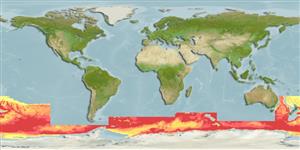Common names from other countries
Classification / Names / Names
Common names | Synonyms | Catalog of Fishes (gen., sp.) | ITIS | CoL | WoRMS
Environment: milieu / climate zone / depth range / distribution range
Ecology
Sessile; depth range 1750 - 6145 m (Ref. 1744). Polar
Antarctic Atlantic and Indo-Pacific: From Antarctica to sub-Antarctic islands, New Zealand and South America. Northeast Atlantic: Europe.
Length at first maturity / Size / Weight / Age
Maturity: Lm ? range ? - ? cm Max length : 20.0 cm TL male/unsexed; (Ref. 3462)
Minimum depth from Ref. 2892.
Life cycle and mating behavior
Maturity | Reproduction | Spawning | Eggs | Fecundity | Larvae
Members of the class Ascidiacea are hermaphroditic; both cross- and self-fertilization is typical. Life cycle: Eggs develop into lecithotrophic larva before metamorphosing into benthic adults.
Sanamyan, K.E. and N.P. Sanamyan. 2002. (Ref. 1744)
IUCN Red List Status (Ref. 130435: Version 2024-1)
CITES status (Ref. 108899)
Not Evaluated
Not Evaluated
Human uses
| FishSource |
Tools
More information
Age/SizeGrowthLength-weightLength-lengthMorphologyLarvaeAbundance
Internet sources
Estimates based on models
Preferred temperature
(Ref.
115969): -0.2 - 1.9, mean 0.4 (based on 5013 cells).
Vulnerability
Low vulnerability (10 of 100).
Price category
Unknown.
